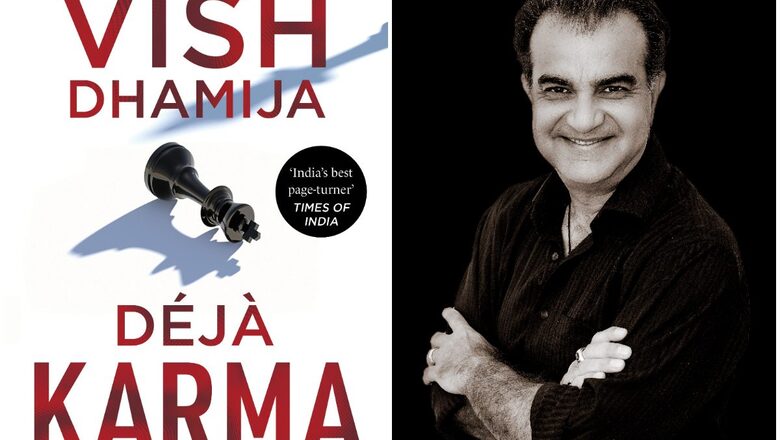
views
Popularly referred to as India’s John Grisham, London-based author Vish Dhamija is the only Indian-origin writer to be listed among the major legal thriller authors of the world. His novels revolve around crime and courtroom drama and are known to have the power to get the readers hooked. His multi-layered plots and relatable characters continue to captivate Indian readers and he has done that with his bestsellers like Nothing Lasts Forever, Bhendi Bazaar and The Heist Artist.
Dhamija was in India recently, to launch his latest book — Déjà Karma. The book revolves around the philosophy of karma. Jay Singh, the best defence lawyer in New Delhi, never loses a case — until he gets this one that can destroy him. Déjà Karma is about him fighting a life-and-death situation in his career and his past, which continues to haunt him today.
One of Dhamija’s book series with its central protagonist Rita Ferreira is also going to be adapted as a web series soon by noted producer Vikram Malhotra.
In an email interview, Dhamija spoke about the research involved in writing a legal thriller and his approach to the genre and more…
Edited excerpts from the interview:
An author needs to do remarkable research, especially while writing a legal thriller. Could you share something about your research regime? How long do you spend researching before beginning a book?
I generally start with the premise of the story: What is the crime, who will commit it, and how will they be caught. There is a lot of research involved after that — legal procedures, courtroom etiquettes, legalese, procedures, chronology. This involves a lot of primary and secondary research. You have to create a balance between factual accuracy and courtroom drama. Typically, I take nine months to write a story, and 50 per cent of the time is taken by research.
What was your hardest scene to write in Déjà Karma?
The hardest was the end. I kept the story aside for, at least, a month before finalising the end. It is what it is (I can’t give it away) because I don’t think the protagonist could have found peace if I had concluded it in any other manner.
The most challenging aspect of writing crime fiction is crafting its characters, be it the protagonist or the antagonist. How do you develop these characters? Is there an inspiration behind some of the characters?
Authors — or for that matter, all artists — are by nature, observant people. We store other people’s mannerisms, quirks, physical traits, and other characteristics we see around us in our minds like an investment banker stores numbers. While I have never used any living person as a character in any of my books, I use what I personally call patchwork or pastiche — mixing traits of various people to construct a single character.
Characterisation is all about casting the right person in the right role. Characters should be relatable and engaging so that they resonate with the readers.
Bhima, the ever-faithful, man Friday for Jay was the real hero of the book for me. His support, strength and actions all make him an endearing character. Who is your favourite? Or which character do you resonate more with?
Great. I wanted the camaraderie between the two men to be such that neither could be complete without the other and the fact that you like Bhima over Jay just proves that to me. They’re like the bulb and lamp — you can only appreciate them if/when they are together.
You’ve mentioned in the book that there is a big difference between being innocent and being not guilty. Please elaborate.
OJ Simpson was found not guilty because of the lack of evidence. That does not make him innocent. “Not guilty” is a legal term used when the court does not have enough evidence to declare an accused guilty — that does not mean that the accused did not commit the crime. Being innocent means the accused was uninvolved in a particular crime.
What perspectives or beliefs have you challenged with this work?
I have always been a proponent of the theory that heaven and hell are in this world, so do not, even for a minute, think that your Karma will not catch up with you. My belief is that this is the world. This is heaven and this is hell. There is no next world. So do good whenever you can without any expectation…and let it cascade.

















Comments
0 comment